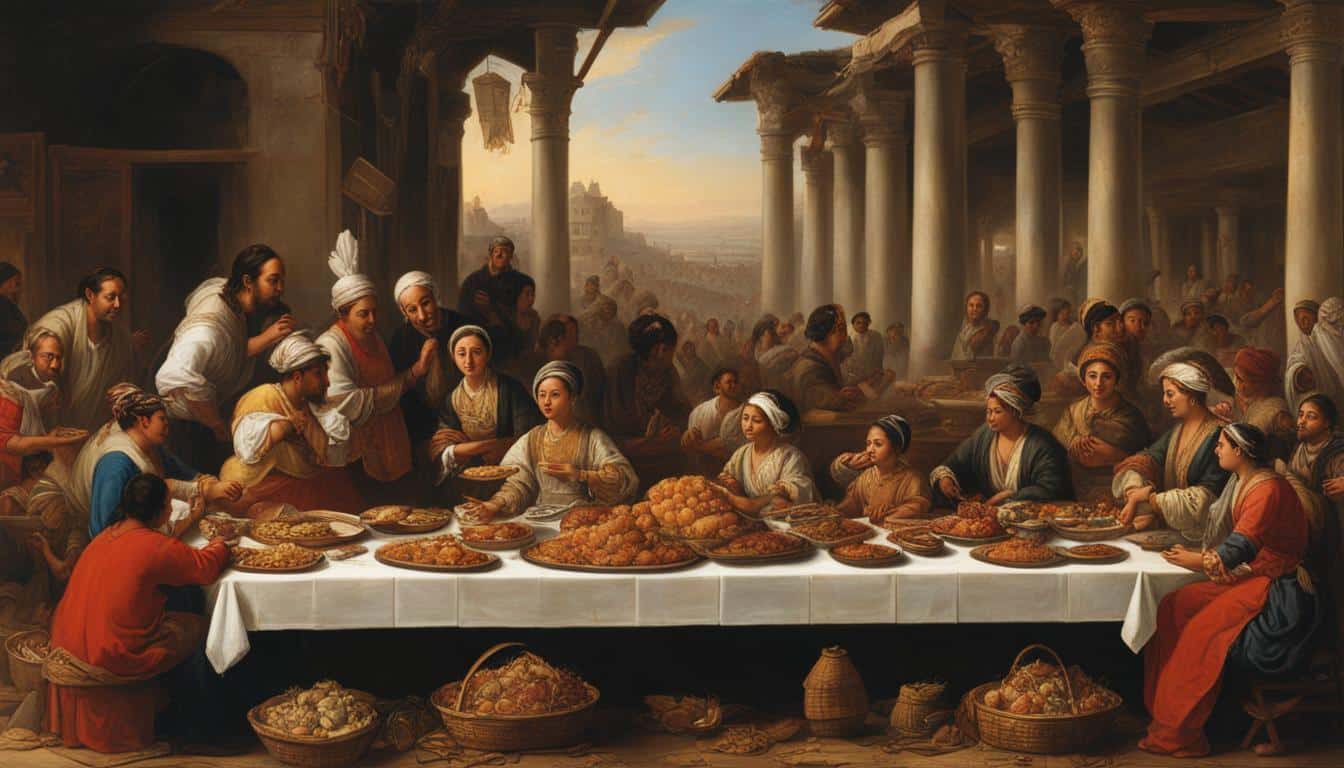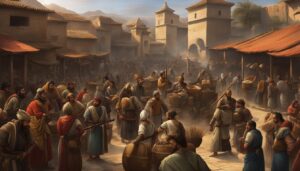
In this in-depth examination, I delve into the concept of economic disparities in biblical society. Drawing insights from biblical material, we explore the prevalence of income inequality, wealth disparity, and social stratification in the Bible. By understanding the principles that govern Christian thinking on contemporary economic issues, we gain valuable insights that transcend time and offer perspectives on economic disparities in our own society.
Key Takeaways:
- Economic disparities were prevalent in biblical society, highlighting the existence of income inequality and wealth disparity.
- The Bible offers principles on responsible stewardship, the distribution of goods, and the obligation to provide for the poor, guiding discussions on contemporary economic issues.
- Comparative analysis reveals that economic inequality was not unique to biblical society, but existed in various ancient civilizations as well.
- Social stratification in the Bible provides insights into the attitudes towards wealth and poverty during that time, further contributing to our understanding of economic disparities.
- By examining economic disparities in biblical society, we gain insights into the societal dynamics and the relevance of these issues in the present-day.
Economic Inequality in Ancient Times: A Comparative Analysis
In order to gain a deeper understanding of economic disparities in biblical society, it is crucial to compare them with the economic inequality prevalent in other ancient civilizations. This section will delve into the existence of class divisions, economic gaps, and imbalances that characterized the socio-economic landscape of ancient times.
Class divisions were a fundamental aspect of ancient societies, including biblical times. In these societies, individuals were stratified based on their social status, with a clear divide between the wealthy elite and the impoverished majority. This class division created a significant economic gap, where a small minority possessed vast wealth while the majority struggled to meet their basic needs.
Furthermore, economic imbalances were prevalent in ancient civilizations, including those depicted in the Bible. These imbalances were a result of various factors such as land ownership, access to resources, and opportunities for economic advancement. This created a cycle of poverty and wealth, where the privileged few accumulated more wealth while the lower classes remained trapped in a cycle of poverty and deprivation.

In conclusion, the comparison of economic inequality in biblical society with other ancient civilizations highlights the pervasive nature of class divisions, economic gaps, and imbalances during ancient times. This analysis deepens our understanding of the socio-economic disparities that shaped biblical society and provides valuable insights into the economic landscape of the Bible.
Social Stratification in the Bible: Perspectives on Wealth and Poverty
In the Bible, socio-economic inequality is a recurring theme that offers valuable insights into the dynamics of wealth and poverty in biblical society. Through biblical narratives and teachings, we can glean perspectives on the attitudes towards economic disparities prevalent in biblical cultures. It is important to examine these perspectives to understand the societal structure and values that influenced wealth distribution in biblical times.
The Portrayal of Wealth
One aspect of social stratification in the Bible is the portrayal of wealth. While wealth is not inherently condemned, the Bible emphasizes the responsibilities that accompany it. Proverbs 29:4 states, “By justice a king gives a country stability, but those who are greedy for bribes tear it down.” This verse highlights the importance of just governance and warns against the negative consequences of greed and corruption. It suggests that wealth should be acquired and used in a just and ethical manner, promoting the well-being of society as a whole.
“By justice a king gives a country stability, but those who are greedy for bribes tear it down.” – Proverbs 29:4
The Call to Care for the Poor
The Bible also emphasizes the obligation to provide for the poor. In Deuteronomy 15:11, it states, “There will always be poor people in the land. Therefore, I command you to be openhanded toward your fellow Israelites who are poor and needy in your land.” This commandment highlights the importance of compassion and generosity towards those less fortunate. It calls for a society that actively works to address economic disparities and uplift the marginalized.
A Comprehensive Understanding
Examining the social stratification and perspectives on wealth and poverty in the Bible provides us with a comprehensive understanding of the economic disparities that existed in biblical society. It underscores the significance of responsible stewardship and the obligation to care for the less fortunate. While the context may differ in modern times, these principles offer valuable insights for shaping our contemporary thinking on socio-economic inequality and wealth disparity.
| Key Themes | Verses |
|---|---|
| Just acquisition and use of wealth | Proverbs 29:4 |
| Obligation to provide for the poor | Deuteronomy 15:11 |
Conclusion
In conclusion, I have provided an in-depth examination of economic disparities in biblical society. Through the analysis of income inequality, class divisions, and socio-economic inequality prevalent in ancient times, we have gained a fuller understanding of the economic landscape of the Bible. It is evident that economic disparities were a significant aspect of biblical society, shaping the lives of individuals and influencing social dynamics.
By examining the perspectives on wealth and poverty present in biblical teachings, we have gained insights into the societal attitudes towards economic inequalities. The Bible acknowledges the existence of wealth and poverty, emphasizing the responsibility of individuals to steward their resources and provide for the less fortunate. These principles hold relevance in contemporary economic discourse, highlighting the enduring nature of economic disparities throughout history.
The comparison of economic inequality in biblical society with other ancient civilizations has shed light on the socio-economic landscape of the time. Class divisions, economic gaps, and imbalances were prevalent across various ancient societies, further emphasizing the universality of economic disparities. In understanding the socio-economic inequality in the Bible, we are able to draw parallels and derive principles that apply beyond the religious context, informing our understanding of economic justice in secular society.
FAQ
What are some key themes explored in the examination of economic disparities in biblical society?
The main themes include responsible stewardship, the distribution of goods, and the obligation to provide for the poor.
How does the analysis acknowledge the applicability of these principles to secular society?
The analysis highlights the provisionality of these principles in a fallen world, suggesting their relevance in contemporary economic discourse.
How does the examination compare economic inequality in biblical society with other ancient civilizations?
It sheds light on the socio-economic landscape of the biblical era by exploring the existence of class divisions, economic gaps, and imbalances.
What does the analysis reveal about poverty and wealth in biblical times?
It provides a deeper understanding of the economic disparities prevalent in ancient societies, including the presence of poverty and wealth.
What perspectives on wealth and poverty are offered in the analysis of social stratification in the Bible?
The analysis draws from biblical narratives and teachings to uncover the societal attitudes towards socio-economic inequality.
What insights can be gained from this examination into the economic disparities that shaped biblical society?
The comprehensive analysis contributes to a deeper understanding of the societal attitudes towards economic inequalities and their relevance in contemporary economic discourse.








